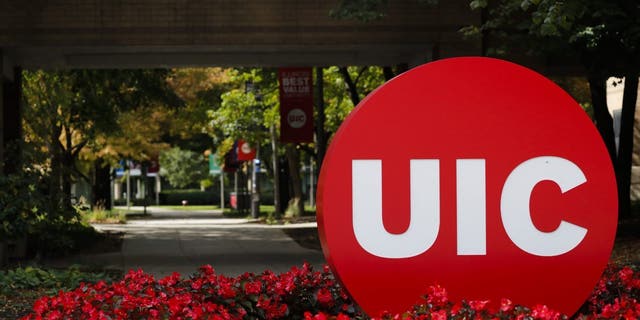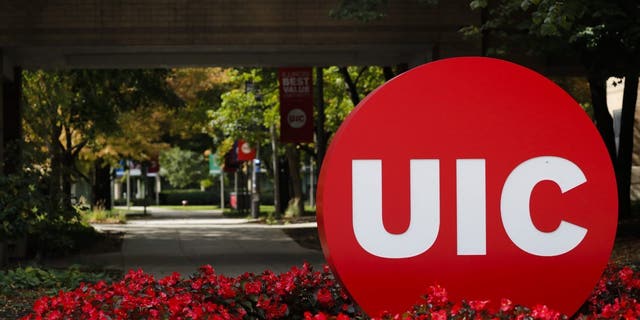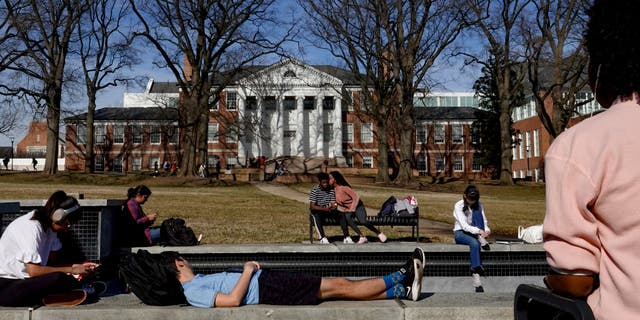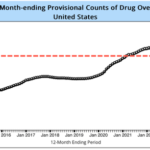
NEWYou can now listen to Fox News articles!
“Health justice” is becoming a new woke agenda item in universities across the country, as progressive academics try to eliminate “fatphobia,” or the cultural stigmatization of obesity, including scrapping the word “obesity” itself.
The University of Illinois Chicago’s school of public health defines weight stigma as “the discrimination or stereotyping based on a person’s weight,” which it claims is “reported at rates comparable to racism and is one of the last types of discrimination still condoned and carried out by public health and medical experts.”
OBESTIY: MORE THAN HALF OF YOUNG ADULTS ARE OVERWEIGHT, STUDY SAYS

The University of Illinois-Chicago (UIC) campus in Chicago in October 2020. (Jose M. Osorio/Chicago Tribune/Tribune News Service via Getty Images) (Jose M. Osorio/Chicago Tribune/Tribune News Service via Getty Images)
“The incidence of weight stigma has increased by 66 percent with the rise of public health campaigns to end the ‘obesity epidemic,’” the school says.
The school released a policy brief in October called, “Addressing weight stigma and fatphobia in public health,” which said the country’s focus on body size is “rooted in racism” dating back to Charles Darwin, and it advised against using “extremely stigmatizing” words like “obesity” in favor of terms such as “people in larger bodies.”
“Though lifestyle factors such as nutrition and exercise are important, it is essential to note the historical racism and injustices within our current food environment,” the brief said. “As presented by Soul Fire Farm, the U.S. food system is built on stolen land using stolen labor from Black and Latinx indigenous people. Not only has this created a large scale food apartheid and trauma for people indigenous to this land, it has caused a disconnection of indigenous people from their cultural practices and identities.”

Obese person measuring his belly. (Credit: iStock)
Several schools across the country have been hosting events on fatphobia in recent weeks.
Last week, the Institute for Bioethics & Health Humanities at the University of Texas Medical Branch in Galveston hosted a lecture on “Fatphobia as Misogynoir: Gender, Race, and Weight Stigma,” where University of California, Irvine associate professor Sabrina Strings addressed “fat stigma” and the “centrality of slavery and race science in its perpetuation throughout the western world.”
During the lecture, Strings argued that the medical field “took up the mantle of anti-fatness as a result of social and cultural shifts in thinking about race and feminine propriety in the early 20th century.”
Strings also gave the lecture at Boston University and Dickinson College in Pennsylvania.
Also last week, Amherst College in Massachusetts hosted a table event titled, “Unpacking Fatphobia: Learning to Love Your Body,” which promised “games, snacks, and a raffle” for participants.
“Are you frustrated with social media commentary surrounding people’s bodies?” the event description read. “Have you ever wondered about the history of diet culture/fatphobia? Do you want to know the difference between the Body Positivity and the Body Neutrality Movements?”

Students relax at The University of Maryland in College Park, MD on February 5, 2018.
CLICK HERE TO GET THE FOX NEWS APP
In February, Claremont McKenna College in California hosted a lecture called, “Fatphobia and Capitalism,” by Ragen Chastain, a self-described “fathlete.”
During the lecture, Chastain addressed how “capitalism, weight stigma, and diet culture intersect to create marginalization, alienation, and harm to people of all sizes” and discussed “strategies to mitigate and transform the status quo around body size culture.”
The apparent trend in college campuses addressing fatphobia follows a Johns Hopkins University School of Medicine study last year that found more than half of young American adults, ages 18-25, are either overweight or obese.









